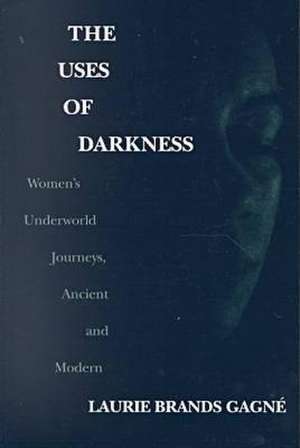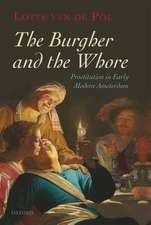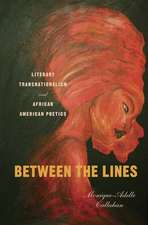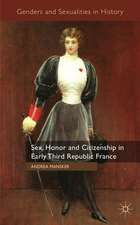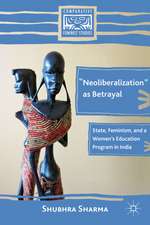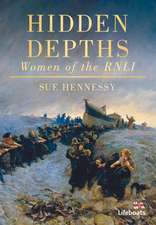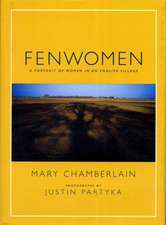The Uses of Darkness – Women`s Underworld Journeys, Ancient and Modern
Autor Laurie Brands Gagnéen Limba Engleză Paperback – 30 aug 2000
| Toate formatele și edițiile | Preț | Express |
|---|---|---|
| Paperback (1) | 227.48 lei 6-8 săpt. | |
| MR – University of Notre Dame Press – 30 aug 2000 | 227.48 lei 6-8 săpt. | |
| Hardback (1) | 585.54 lei 6-8 săpt. | |
| MR – University of Notre Dame Press – 30 aug 2000 | 585.54 lei 6-8 săpt. |
Preț: 227.48 lei
Nou
Puncte Express: 341
Preț estimativ în valută:
43.53€ • 45.45$ • 36.03£
43.53€ • 45.45$ • 36.03£
Carte tipărită la comandă
Livrare economică 04-18 aprilie
Preluare comenzi: 021 569.72.76
Specificații
ISBN-13: 9780268043063
ISBN-10: 026804306X
Pagini: 238
Dimensiuni: 140 x 216 x 13 mm
Greutate: 0.32 kg
Ediția:1
Editura: MR – University of Notre Dame Press
ISBN-10: 026804306X
Pagini: 238
Dimensiuni: 140 x 216 x 13 mm
Greutate: 0.32 kg
Ediția:1
Editura: MR – University of Notre Dame Press
Recenzii
“Gagné explores women's psychological and spiritual journeys through the lens of three ancient myths and modern literature. Many feminists seek to recover the goddess of preliterary civilizations. Gagné claims that the literary myths of underworld journeys of the goddesses Innana, Demeter/Persephone, and Psyche are integral to her wholeness as a Christian woman. She says that Innana illustrates that one cannot move from powerless to compassionate without first venting anger, while Demeter/Persephone shows that the discovery of wholeness is never once-and-for-all; Psyche demonstrates the struggle to discover self within passionate relationships. Gagné is convinced these stories are useful because they integrate sexuality and suffering, leading to a new experience of God. Explaining how these themes are explored in the works of Sylvia Plath, Joan Didion, Mary Gordon, Virginia Woolf, and other authors, she concludes with reflections drawn from the diary of Etta Hillesum—a woman who exemplified the underworld experiences and encountered God. Erudite and well written, this book offers a fresh perspective for Christian feminist-heirs to a tradition that has distanced bodily experience from spiritualities. Those unfamiliar with the literature that Gagné refers to will have limited appreciation of the study—those who know it will find her work masterful. For libraries supporting women's studies, literature, and spirituality; upper-division undergraduates and above.” —Choice, June 2001, Vol. 38 No. 10
“Three Years of Writing, twelve years of teaching a course on the “Woman’s Journey,” and a lifetime of intense introspection have resulted in a hypnotic, ...monolog that describes the author’s journey towards achieving an edifiying sense of self-knowledge.” —Utopian Studies, May 2002
Notă biografică
Laurie Brands Gagné is director of the Edmundite Center for Peace and Justice at St. Michael's College in Vermont. She has published several articles on spirituality, including two on philosopher / mystic Simone Weil.
Textul de pe ultima copertă
Laurie Brands Gagné believes the image of God as stern Father or Judge has done much damage over the centuries and has engendered a sense of shame and guilt, especially in women. She sees our own civilization as one that is cut off from the natural world and from the precious part of ourselves that is earthy and sensual.
In The Uses of Darkness: Women’s Underworld Journeys, Ancient and Modern, Gagné explores women’s journeys through the underworld to reclaim the wisdom and sensuality contained in these stories for heirs of the God the Father tradition. She looks at the ancient stories of Inanna, Demeter, and Psyche and the reflections of these archetypal figures in the work of women such as Sylvia Plath, Joan Didion, Mary Gordon, Virginia Woolf, and Etty Hillesum to illustrate that the alternative tradition these journey stories represent has much to offer modern Christians. Gagné successfully demonstrates that only by turning to confront the mystery that has been obscured by the image of God as stern Father or Judge can a woman raised in the Christian tradition acquire a sense of self strong enough to integrate experiences of profound loss. Most importantly, by drawing on the wisdom of the goddess tradition, both men and women are able to effect a more meaningful reappropriation of Christianity.
Gagné’s examination of the dark experience of the underworld in the goddess tradition discovers the elements of all spiritual journeys: self-transcendence followed by self-transformation. Anyone who has struggled with love and loss and whose spirit has been suppressed by the image of God as Judge, yet who will not reject Christianity, will benefit from this work.
Laurie Brands Gagné is director of the Edmundite Center for Peace and Justice at St. Michael's College in Vermont. She has published several articles on spirituality, including two on philosopher / mystic Simone Weil.
In The Uses of Darkness: Women’s Underworld Journeys, Ancient and Modern, Gagné explores women’s journeys through the underworld to reclaim the wisdom and sensuality contained in these stories for heirs of the God the Father tradition. She looks at the ancient stories of Inanna, Demeter, and Psyche and the reflections of these archetypal figures in the work of women such as Sylvia Plath, Joan Didion, Mary Gordon, Virginia Woolf, and Etty Hillesum to illustrate that the alternative tradition these journey stories represent has much to offer modern Christians. Gagné successfully demonstrates that only by turning to confront the mystery that has been obscured by the image of God as stern Father or Judge can a woman raised in the Christian tradition acquire a sense of self strong enough to integrate experiences of profound loss. Most importantly, by drawing on the wisdom of the goddess tradition, both men and women are able to effect a more meaningful reappropriation of Christianity.
Gagné’s examination of the dark experience of the underworld in the goddess tradition discovers the elements of all spiritual journeys: self-transcendence followed by self-transformation. Anyone who has struggled with love and loss and whose spirit has been suppressed by the image of God as Judge, yet who will not reject Christianity, will benefit from this work.
Laurie Brands Gagné is director of the Edmundite Center for Peace and Justice at St. Michael's College in Vermont. She has published several articles on spirituality, including two on philosopher / mystic Simone Weil.
Laurie Brands Gagné believes the image of God as stern Father or Judge has done much damage over the centuries and has engendered a sense of shame and guilt, especially in women. She sees our own civilization as one that is cut off from the natural world and from the precious part of ourselves that is earthy and sensual.
In The Uses of Darkness: Women’s Underworld Journeys, Ancient and Modern, Gagné explores women’s journeys through the underworld to reclaim the wisdom and sensuality contained in these stories for heirs of the God the Father tradition. She looks at the ancient stories of Inanna, Demeter, and Psyche and the reflections of these archetypal figures in the work of women such as Sylvia Plath, Joan Didion, Mary Gordon, Virginia Woolf, and Etty Hillesum to illustrate that the alternative tradition these journey stories represent has much to offer modern Christians. Gagné successfully demonstrates that only by turning to confront the mystery that has been obscured by the image of God as stern Father or Judge can a woman raised in the Christian tradition acquire a sense of self strong enough to integrate experiences of profound loss. Most importantly, by drawing on the wisdom of the goddess tradition, both men and women are able to effect a more meaningful reappropriation of Christianity.
Gagné’s examination of the dark experience of the underworld in the goddess tradition discovers the elements of all spiritual journeys: self-transcendence followed by self-transformation. Anyone who has struggled with love and loss and whose spirit has been suppressed by the image of God as Judge, yet who will not reject Christianity, will benefit from this work.
Laurie Brands Gagné is director of the Edmundite Center for Peace and Justice at St. Michael's College in Vermont. She has published several articles on spirituality, including two on philosopher / mystic Simone Weil.
In The Uses of Darkness: Women’s Underworld Journeys, Ancient and Modern, Gagné explores women’s journeys through the underworld to reclaim the wisdom and sensuality contained in these stories for heirs of the God the Father tradition. She looks at the ancient stories of Inanna, Demeter, and Psyche and the reflections of these archetypal figures in the work of women such as Sylvia Plath, Joan Didion, Mary Gordon, Virginia Woolf, and Etty Hillesum to illustrate that the alternative tradition these journey stories represent has much to offer modern Christians. Gagné successfully demonstrates that only by turning to confront the mystery that has been obscured by the image of God as stern Father or Judge can a woman raised in the Christian tradition acquire a sense of self strong enough to integrate experiences of profound loss. Most importantly, by drawing on the wisdom of the goddess tradition, both men and women are able to effect a more meaningful reappropriation of Christianity.
Gagné’s examination of the dark experience of the underworld in the goddess tradition discovers the elements of all spiritual journeys: self-transcendence followed by self-transformation. Anyone who has struggled with love and loss and whose spirit has been suppressed by the image of God as Judge, yet who will not reject Christianity, will benefit from this work.
Laurie Brands Gagné is director of the Edmundite Center for Peace and Justice at St. Michael's College in Vermont. She has published several articles on spirituality, including two on philosopher / mystic Simone Weil.
Descriere
God's image as Judge can engender shame and guilt in women. This study explores the underworld journeys of women like Demeter and Psyche, and their reflections in works by such women as Sylvia Plath and Virginia Woolf, arguing that the tradition they represent has much to offer modern Christians.
